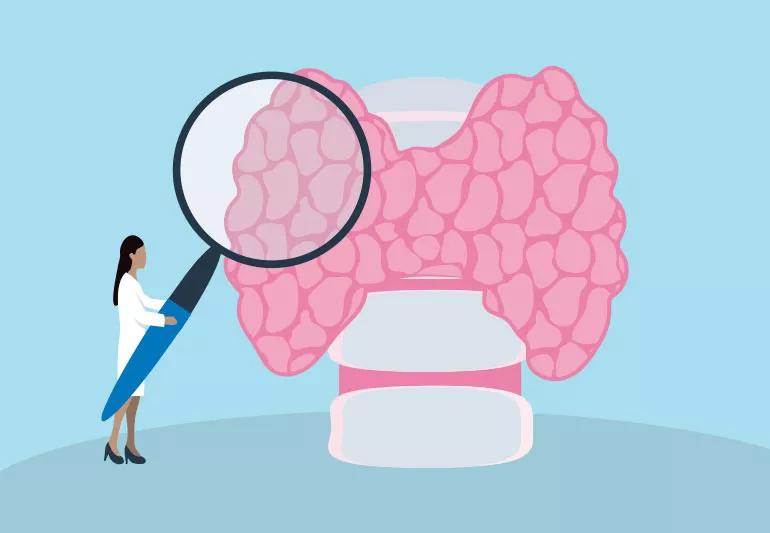Learn your family history to understand your risk

Your thyroid gland plays a key role in making sure that your body operates at peak performance. It releases just the right amount of thyroid hormone to help regulate the body’s functions.
Advertisement
Cleveland Clinic is a non-profit academic medical center. Advertising on our site helps support our mission. We do not endorse non-Cleveland Clinic products or services. Policy
But if something is out of whack with your thyroid, you may experience:
Thyroid diseases generally aren’t preventable. (If you’ve been avoiding soy or cauliflower to decrease your risk … that’s just a myth.) But according to endocrinologist Christian Nasr, MD, many thyroid diseases do run in families.
“Knowing your family history can help you stay one step ahead of complications from a thyroid disorder and related conditions,” he says.
“More than 75% of the time, patients with thyroid disease tell me that someone on one side of their family has thyroid disease,” says Dr. Nasr.
“The more family members that have thyroid disease, the greater the likelihood that there is a hereditary root. And the higher the chances the patient will experience a thyroid problem.”
Autoimmune disorders seem to be a genetic link for some of the familial thyroid disorders, he notes. Autoimmune disorders occur when white blood cells go haywire and attack the cells that regulate body functions. The immune system’s foul play could cause the thyroid gland to produce too much or too little hormone. So having an autoimmune disease may increase your risk for thyroid disease, Dr. Nasr says.
But this same action — the white blood cells attacking body cells — could result in other autoimmune disorders like diabetes, lupus or rheumatoid arthritis, too.
Advertisement
“In a family, the same person could have an autoimmune disorder that causes hypothyroidism and another that causes diabetes,” says Dr. Nasr. “And you may have a different family member who has diabetes, but not thyroid disease.”
The takeaway: Inform your healthcare provider if any autoimmune diseases run in your family, even if there isn’t an obvious thyroid connection.
Dr. Nasr has found that even thyroid cancers that aren’t considered hereditary can have a family link. “I’ve had situations where multiple family members have had the type of thyroid cancer that’s usually not hereditary,” he says.
Clustering of cancers in families isn’t unique to thyroid cancer. Some families carry a mutation that suppresses “good” genes in the body, which can put them at risk for a variety of cancers.
“Different syndromes can increase someone’s risk for certain types of cancer,” Dr. Nasr explains. “Cowden’s syndrome, for example, increases your risk of thyroid, breast and uterine cancers. Your family history may not include thyroid cancer, but if we see a lot of breast and uterine cancers, we may want to investigate whether there is a syndrome that puts you at risk for thyroid nodules or cancer.”
The takeaway: As with the autoimmune disorders, know your family history. This information helps your healthcare team find patterns that might indicate thyroid disease-causing gene mutations lurking in the background.
What if you don’t know about your family’s history with thyroid disease? These symptoms may indicate it’s time to seek medical care:
Once you’ve addressed your symptoms with your provider, they will likely perform a neck exam and a simple blood screening test. If all systems appear to be operating well, your doctor may recommend monitoring over time. If any of the results are concerning, your doctor may refer you to an endocrinologist or order an imaging test. And if you have a strong family history, genetic testing may help you make important healthcare decisions.
Advertisement
Advertisement
Learn more about our editorial process.
Advertisement

Hypothyroidism is underactivity of your thyroid gland, while hyperthyroidism is overactivity — but both conditions need treatment

No diet can cure hypothyroidism or hyperthyroidism, but some foods and supplements can cause trouble

Foods high in selenium, like Brazil nuts, cottage cheese and some fish, can help support healthy thyroid function

Only take supplements recommended by your healthcare provider — others can worsen your condition

Typical signs include growth delays and low energy

Hyperthyroidism can make you feel sluggish and exhausted — but so can other conditions

The truth about natural thyroid symptom relief

Wearing a scarf, adjusting your outdoor activities and following your asthma treatment plan can help limit breathing problems

Your diet in the weeks, days and hours ahead of your race can power you to the finish line

When someone guilt trips you, they’re using emotionally manipulative behavior to try to get you to act a certain way